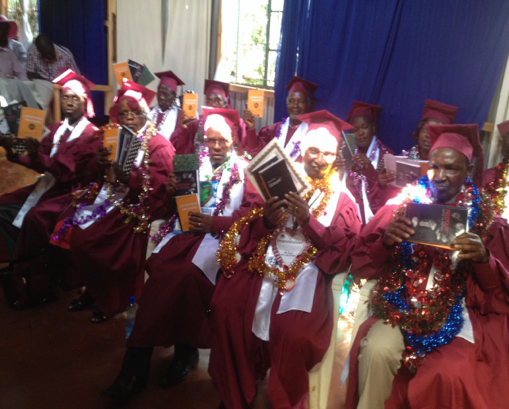The gospel is widely accepted in Africa, but many churches are full for all the wrong reasons. Need a curse broken? A fortune reversed? These promises fall assuredly from the lips of “apostles” and “prophets” on Christian television, and from church pastors called “daddy” or “papa.”
In a report for TGC International Outreach (TGC IO), Charles Karuri addressed the problem of false teaching that has swept across the African continent. Karuri, pastoral assistant at Emmanuel Baptist Church in Nairobi, Kenya, described the “prosperity gospel” as a malevolent concoction: “African poverty, joblessness, and general societal dysfunction meeting an antithesis borne of Pentecostalism and traditional African religion.”
Prosperity teachers in Africa claim the ability to heal sickness, break curses, restore marriages, reverse bad fortune, and more. “These are the very things the witch doctor back in the village had been doing long before the prosperity message arrived on our shores,” Karuri said.
[Prosperity theology] is a malevolent concoction: ‘African poverty, joblessness, and general societal dysfunction meeting an antithesis borne of Pentecostalism and traditional African religion.’
Karuri further explained how deceptive teaching affects African churches offering an unadulterated gospel: “Those that faithfully preach the gospel continue to be less and less the face of Christianity as they are overtaken by numerically superior, flashier, noisier, and more outwardly successful prosperity churches.”
Deconstructing Arguments
Karuri’s church has partnered with TGC IO to distribute a book he views as a timely tool to “effectively deconstruct the favorite arguments of the prosperity camp.” This book features the input of five men, three of whom are African—including Emmanuel’s senior pastor, Kenneth Mbugua.
Prosperity? Seeking the True Gospel, published as a Packing Hope project of TGC IO, is a free resource for Africa and beyond. The book helps believers understand and address the issue of false teaching and the prosperity gospel in particular. Though in English, the book serves many African countries that use English as an official or a secondary language.
In western Kenya, Eric Ngala Mutumbi serves a congregation in Bumala, a town near Lake Victoria some 50 miles from the nearest city. Traditional theological training is not an option for Mutumbi and other rural pastors. He says they “cannot and should not” leave their churches, communities, and families to live in cities where theology schools can be found.
Mutumbi encourages poor pastors in Bumala by providing theological training for a distance-learning group sponsored by Mukhanyo Theological College. His main challenge is the prevalence of prosperity teaching.
Some of his students once accepted and passed on a twisted gospel message.
“They were brought up believing—and teaching—that once you get saved, you will receive good jobs, families, education, and lots of money,” Mutumbi said. “They thought they could twist people’s arms with a false gospel to get them to give.”
When prosperity did not come, many became disillusioned—and dissatisfied with Christianity.
Moving Forward Together
In 2015, Mutumbi contacted Michael Otieno Maura, a Reformed Baptist preacher in Kenya, hoping to find resources to help his students defend the gospel against false teaching. Maura, one of five contributors to Prosperity? Seeking the True Gospel, immediately responded by sending internet links and several photocopied pages from the book. Weeks later, Mutumbi received 120 copies of the book in the mail from Maura (whom TGC IO asked to help distribute copies from the initial print run of 10,000).
Mutumbi appreciates the many biblical references in the new resource that counters prosperity teaching. “Armed with this book, I can prepare myself and others to use the Bible as the final authority on this subject,” he said.
Most of the pastors in Mutumbi’s remote area have studied English and can read it. He uses the books in several settings:
- In distance-learning and conference groups he organizes, pastors move forward together by discussing the books and then role-playing presentations of the true gospel.
- Pastors in the neighboring country of Uganda have received books through Mutumbi’s participation in International Training and Equipping Ministry (ITEM) and, elsewhere, through a course he teaches on expository preaching.
- Mutumbi’s Africa Inland Church benefits from his deeper sermon preparation with help from the book. He studies each discussion of Bible passages to more accurately explain Scripture.
- Using arguments from the book, Mutumbi articulates answers about the problem of false teaching to a wider audience by radio. With airtime provided by African Bible University, he speaks in Kiswahili, the common language of his region.
Newfound Confidence
Pastors in Mutumbi’s poor area who once manipulated their congregations into giving money have realized Jesus is Lord over every area of life—including daily resources. They now raise chickens and plant vegetable gardens for their provisions. Above all, they now preach a gospel that glorifies God.
Both Mutumbi and Karuri are thankful for TGC IO supporters who enabled the printing of more than 50,000 copies of Prosperity? Seeking the True Gospel.
“I now have a tool to fight against false teaching,” Mutumbi said. “I now have confidence!”
Editors’ note: TGC has free copies of Prosperity?: Seeking the True Gospel in English, available for giveaway through your missions efforts. Inventory is available in the United States and United Kingdom. Join us in the cause of Theological Famine Relief. For those serving the church in Kenya and East Africa, please take note of The Proclaim Conference this May in Nairobi.
Is there enough evidence for us to believe the Gospels?
 In an age of faith deconstruction and skepticism about the Bible’s authority, it’s common to hear claims that the Gospels are unreliable propaganda. And if the Gospels are shown to be historically unreliable, the whole foundation of Christianity begins to crumble.
In an age of faith deconstruction and skepticism about the Bible’s authority, it’s common to hear claims that the Gospels are unreliable propaganda. And if the Gospels are shown to be historically unreliable, the whole foundation of Christianity begins to crumble.






































